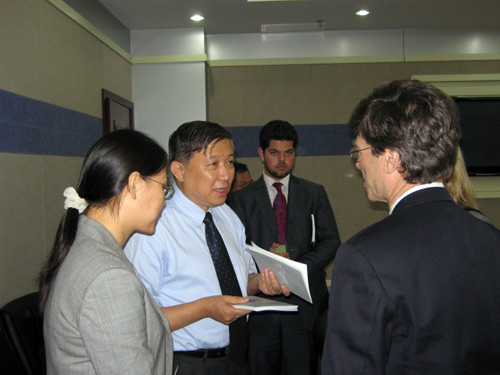
Minister XU Guanhua met with Professor Jeffery Sachs, Special Advisor to United Nations Secretary-General Kofi Annan on the Millennium Development Goals and Director of the UN Millennium Project, with his wife and other guests on August 17, 2006.
In the meeting, Prof. Sachs shared personal view on issues of his concern, namely, the global energy system, world climate change and the prediction of China in 2050. On issues of global energy system and climate change, Prof. Sachs maintained that coal keeps on holding an important position in future’s energy structures. If IGCC (Integrated Gasification Combined Cycle) and CCS (Carbon Capture and Storage) technology could be combined to form a comprehensive system, it will curb global green house gas (GHG) emission. He hoped that China would be part of the effort. As for the China in 2050 prediction, Prof. Sachs believed that sustainable development would be a major issue with China’s rapid and steady economic growth. Despite of many technical uncertainties, the prediction still offers positive meaning.
Minister XU extended his sincere welcome to Prof. Sachs and his companies and thanked for his commitment to China’s sustainable development. Addressing to the questions of Prof. Sachs’s concern, Minister XU briefed the guests on China’s Medium and Long-Term S&T Development Plan and China’s policies of granting energy, water resources and environment protections with national priorities. As for clean coal and CCS technology, Minister XU briefed on latest development in China’s IGCC and CCS collaboration with UN agencies. Minister XU stressed that cutting cost remained the focus in applying IGCC and CCS, and science and technology was the key to it. Minister XU agreed with Prof. Sachs prediction over China in 2050, saying the priority was to identify the factors that might lead to the collapse of the whole system. In the end, Minister XU said that China had taken part in many major international S&T programs and engineering collaborations. He believed that in the future China would be more capable of joining in international cooperation; therefore, China would strengthen ties with international organizations including the UN and explore chances of mutually beneficial cooperation.
Jeffery D. Sachs is Professor of Health Policy and Management at Columbia University. He was named as one of the 100 most influential people in the world by Time Magazine in 2004 and 2005. At the invitation of the National Development and Reform Commission (NDRC), Prof. Sachs visited China to have discussions with relevant departments and ministries and get to know about the execution of UN Millennium Projects in China
(Department of International Cooperation)

